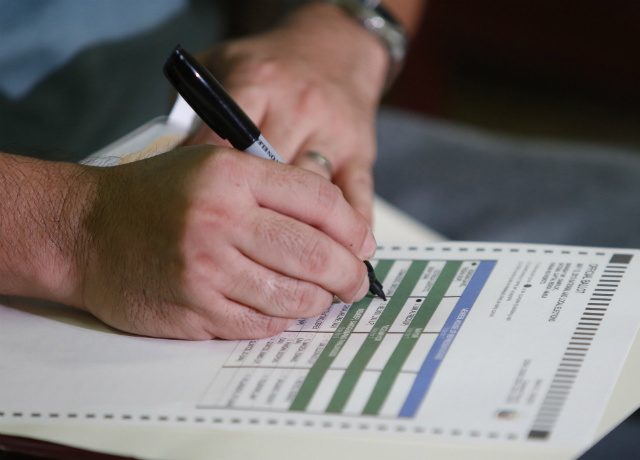SUMMARY
This is AI generated summarization, which may have errors. For context, always refer to the full article.

MANILA, Philippines – Way past the deadline, the Commission on Elections (Comelec) submitted a comment to the Supreme Court (SC) to defend its decision not to issue voting receipts for the May 9 polls.
In its 10-page comment filed before the SC, the Comelec argued that paper ballots already serve the purpose of voting receipts.
The poll body said issuing separate voting receipts from vote-counting machines (VCMs) “is a surplusage.” (READ: EXPLAINER: Why it’s alright not to have voting receipts)
“The paper ballot, manually filled out and personally fed into the VCM, is the best evidence of the votes cast,” the Comelec said in the late comment filed on its behalf by the Office of the Solicitor General.
The Comelec added that the paper ballot “already satisfies” the minimum standards for a Voter Verified Paper Audit Trail (VVPAT).
The VVPAT is supposed to allow the manual auditing of votes in an automated election system.
The Comelec said the paper ballot, in fact, “is also the VVPAT (emphasis theirs) since it ‘faithfully captures or represents the votes cast by a voter recorded or to be recorded in electronic form.’”
The Comelec submitted this comment to the SC only on Monday, March 7, when the High Court set the deadline last week. The SC on February 23 required the Comelec to submit a comment 5 days upon the receipt of an official notice. The Comelec requested for an extension but the SC denied it.
The Comelec distributed copies of this comment to reporters late Tuesday afternoon, March 8, hours after the SC unanimously ordered the Comelec to issue voting receipts. (READ: Supreme Court ruling thrusts Comelec in state of emergency)
Electronic vs paper ballots
In arguing its position, the Comelec said it “is important to distinguish” between two kinds of automated elections systems. One is the direct recording election (DRE) system, while the other is the paper-based election system.
Under a DRE system, a voter directly casts his or her vote in the machine through electronic means. The Comelec calls these “electronic ballots.”
Because the DRE provides “only electronic trails and, ordinarily, no paper audit trail” of votes, “the voting receipt becomes an essential audit trail to prevent electoral fraud.”
The voting receipts in a DRE system “will allow voters to verify that their vote was cast correctly by the machine.”
The Comelec said: “The situation is different in a paper-based election system where, as in the present case, there are numerous audit trails of the votes cast, specifically: (1) the paper ballot, (2) the ballot image, (3) storage media cards, and (4) the on-screen verification functionality.”
“In this instance where there is a paper audit trail of the paper ballot and other various electronic audit trails, the issuance of a voting receipt is a surplusage,” the poll body said.
The Comelec added that the law doesn’t require the “immediate” tallying of votes “as interpeted by the VCM and the votes cast in the paper ballot.”
“What the law requires is merely system auditability for the public to verify that the votes are recorded and counted correctly by the VCM,” it said.
The poll body explained that it also conducts a random manual audit (RMA) of votes. In this process, auditors manually tally the votes in random precincts and compare these with the votes as counted by the machines.
Comelec Commissioner Luie Guia earlier said the Comelec will conduct the RMA in more election precincts compared to 2013.
Comelec to appeal SC ruling
On top of the RMA that is required by law, the Comelec said it has allowed the on-screen verification of votes. Through this feature, VCMs will display each person’s votes on the monitor for 15 seconds at most. This will allow voters to verify their votes.
The on-screen verification of votes can lengthen the voting time by at least two hours and 30 minutes, but the Comelec said it made this “gamble” for the sake of transparency.
The Comelec said in its comment: “The additional measure of on-screen verification, apart from the paper ballot, is a protective redundancy to ensure honest and credible elections. The Comelec has therefore enabled numerous security features of the paper ballot and the VCM, which render electronic electoral fraud highly improbable.”
The Comelec added that voting receipts can facilitate vote-buying, with voters possibly showing their receipts to political operators in exchange for money. It can also lengthen the voting time by hours.
The Comelec pointed out, too, that 3 consecutive batches of Comelec members – including those under former chairmen Jose Melo and Sixto Brillantes Jr, and current chairman Andres Bautista – have unanimously decided against the voting receipts.
It is unclear if the SC read the Comelec’s late submission before unanimously ordering the poll body to issue voting receipts.
The SC ruling has now thrust the poll body into a state of emergency. (READ: Comelec’s options after SC order for vote receipts)
The ruling practically required the Comelec to overhaul months-long processes within 60 days. These include reconfiguring more than 92,500 SD memory cards and bidding out an additional 1.2 million rolls of thermal paper.
Because of this, the Comelec said it is considering postponing the May 9 elections or holding manual polls.
Still, the Comelec is set to appeal the SC ruling that required voting receipts. – Rappler.com
Add a comment
How does this make you feel?
There are no comments yet. Add your comment to start the conversation.